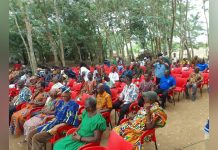Africa-Press – Ghana. Nigeria became the first African country this week to receive a batch of vaccines against mpox, a viral disease whose rapid spread led the World Health Organization to declare a global health emergency in mid-August. While more vaccine doses are available, experts say high costs and regulatory hurdles have prevented the jabs from reaching the countries in central Africa that most need them.
Central Africa is seeing a rapid increase in mpox cases, with nearly 4,000 reported in a week, the continent’s public health body said Tuesday, reiterating a plea for long-awaited vaccines to combat a virus that is believed to have infected tens of thousands of people and killed more than 600 since the start of the year.
The US on Tuesday donated 10,000 doses of mpox vaccines to Nigeria, the first such donation to Africa since the current outbreak. Several other countries have also promised to send vaccines to the continent, with Spain alone pledging half a million doses.
But there are still no jabs currently available in countries like the Democratic Republic of Congo, where mpox has circulated since January of last year and a new variant is preying on vulnerable, displaced populations, even as wealthy countries continue to inoculate people who are at lower risk. Press looks at the funding, logistical and regulatory challenges that have hindered the distribution of mpox vaccines in Africa.
What is mpox?
Formerly known as monkeypox, mpox is a viral disease that belongs to the same family of viruses as smallpox. It mostly spreads through close skin-to-skin contact, including sex, and causes fever, muscle pain and skin lesions. Mpox generally causes milder symptoms than smallpox but can also kill.
A recent resurgence of the virus and the detection in Central Africa of a new strain, dubbed Clade 1b, prompted the WHO to declare a global health emergency – its highest level of alert – on August 14. On Tuesday, African’s main public health body, the Africa Centers for Disease Control and Prevention (Africa CDC), said there were more than 22,800 suspected mpox cases and 622 deaths on the continent and that infections had jumped 200% in the last week.
The Democratic Republic of Congo, where the new strain was first detected, has borne the brunt of the epidemic with 90 percent of reported mpox cases this year, most of them in children under 15. Burundi, Rwanda, Kenya and Uganda have also been affected.
What vaccines are available?
Traditional smallpox vaccines offer protection against mpox, but they ceased to be administered in Africa in the 1980s following the global eradication of smallpox. That means younger generations are now more exposed.
More recent vaccines with fewer side-effects have been widely used in wealthier countries in the wake of a global mpox outbreak in 2022. They include the MVA-BN jab developed by Danish manufacturer Bavarian Nordic, also known by its trade names Jynneos in the US and Imvanex in Europe, and Japan’s LC16 vaccine.
Only the LC16 jab is currently approved for use in children.
The Africa CDC estimates that 10 million doses are needed across the continent to fight the current outbreaks, with DR Congo the country most in need.
Africa priced out
Following the 2022 outbreaks, wealthy countries were quick to draw on their stockpiles of the new vaccines to protect their own populations, while only a trickle of doses reached Africa despite pleas from its governments.
At a news briefing in Geneva on Tuesday, WHO spokesperson Tarik Jasarevic told reporters that the producer of MVA-BN, Bavarian Nordic, “has capacity to manufacture 10 million doses by end of 2025 and can already supply up to two million doses this year”. He also said there was a “considerable” stockpile of the Japanese-made LC16 vaccine.
However, both vaccines carry a prohibitive cost for most African countries whose fragile health systems face a host of other daunting challenges. So far, Africa has secured less than 10 percent of the estimated $245 million (€221 million) it needs to fight surging mpox outbreaks, Africa CDC’s Chief of Staff Ngashi Ngongo told a WHO meeting in the Republic of Congo’s capital Brazzaville on Wednesday. The agency’s Director-General Jean Kaseya urged vaccine manufacturers to share the know-how needed for the jabs to be produced locally at a lower price.
“We told Bavarian Nordic that we need a transfer of technology towards African manufacturers,” Kaseya told the Brazzaville meeting, adding that he believed mpox vaccines would be made in Africa “very soon”.
Regulatory hurdles
Experts say red tape has proved to be another major obstacle to the distribution of urgently needed vaccines in Africa.
Low-income countries traditionally rely on the WHO, rather than their own drug regulators, to judge which medications are safe and effective. The agency’s approval is required for UNICEF and GAVI, the organisation that helps facilitate vaccination campaigns in developing nations, to purchase and distribute vaccines in countries that cannot afford to buy them.
That leaves the likes of DR Congo at the mercy of the WHO’s “byzantine drug regulatory process”, the New York Times reported last week, citing health experts who described the agency as “painfully risk-averse” and “ill-prepared to act swiftly in emergencies”.
Two years on from the 2022 mpox outbreak, the WHO is yet to officially approve the MVA-BN and LC16 vaccines, saying it does not have the data required to carry out a full review.
The global health agency has only this month triggered an “Emergency Use Listing” process to fast-track approvals and enable GAVI and UNICEF to procure mpox vaccines.
What pledges have wealthy countries made?
Spain’s health ministry announced this week that it would dip into its mpox vaccine stockpile to donate 20 percent of its supply, about 500,000 doses, to African countries battling mpox.
“We consider it senseless to accumulate vaccines where they are not needed,” Spain’s health ministry said in a statement, adding that Madrid would urge the European Commission to propose that all EU member states also donate 20 percent of their vaccine stock. Spain’s donation alone is more than what the European Union and the US have pledged so far. Other pledges include 215,000 doses from vaccine maker Bavarian Nordic and some 100,000 doses each from France and Germany.
Japan, a regular donor, is also in negotiations with the government of DR Congo to supply LC16 vaccines.
What else can be done to combat mpox?
Even if donations are rapidly ramped up, it is unlikely that there will be enough vaccines for the entire population of DR Congo and neighbouring countries, said Anna-Lise Williamson, a professor of vaccinology at the Institute of Infectious Disease and Molecular Medicine of the University of Cape Town.
“Surveillance needs to be strengthened to determine factors responsible for the spread of the virus,” Williamson wrote on The Conversation. “This will enable the people at highest risk to be targeted with vaccine campaigns.”
Although vaccines are essential, they are “just some of the tools”, said the WHO’s Jasarevic, alongside contact tracing, strong surveillance, public health measures and adequate clinical care for those who need it. Kaseya said Africa CDC is working on a unified response plan to deal with the outbreaks that will be presented to African heads of state for consideration at a meeting in September. African countries are currently promoting hygiene practices to slow the spread of the mpox virus, he said.
Experts, however, say such measures are difficult to enforce in DR Congo, where more than 7 million people fleeing a spike in violence after disputed December 2023 elections are crammed in camps and the health system is already at breaking point, weighed down by epidemics of measles and Ebola and years of armed conflict.
Dr. Dimie Ogoina, a professor of infectious diseases at Niger Delta University in Nigeria, told the WHO meeting in Brazzaville that, in the absence of vaccines and drugs, African health workers should focus on providing supportive care like ensuring patients have enough to eat and have access to mental health support, given the stigma that often comes with mpox.
“It’s very, very unfortunate that we have had mpox for 54 years and we are only now thinking about therapeutics,” he said.
france24
For More News And Analysis About Ghana Follow Africa-Press







